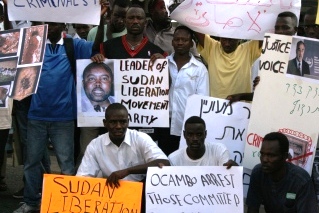 Refugees in Israel, photo by Trillia Fidei Bagwell
Refugees in Israel, photo by Trillia Fidei BagwellOn Thursday, 7 July 2011, the High Court of Justice gave its ruling on the petition against the “Hot Returns Procedure,” which deals with the immediate deportation of asylum seekers to Egypt after they have crossed Israel’s southern border. The petition was filed in August 2007 by the Hotline for Migrant Workers, the Association for Civil Rights in Israel (ACRI), Physicians for Human Rights – Israel, ASSAF – Aid Organization for Refugees and Asylum Seekers in Israel, and the Israel Religious Action Center – after a group of 44 Sudanese asylum seekers was deported to Egypt and disappeared.
The “Hot Returns Procedure” was based on a claim by the State of Israel that the former Prime Minister of Israel, Ehud Olmert, and the former President of Egypt, Hosni Mubarak, made a verbal agreement in 2007 that asylum seekers will be returned by Israel to Egypt and Egypt will ensure their safety, not deport them to their countries of origin, and will review their requests for asylum. Egypt has denied the existence of such an agreement.
After almost four years of discussions, and due to the court’s demand for clarifications from the State regarding the implications of political changes in Egypt on this policy, the State of Israel has declared that at this point, no “hot returns” are taking place. Following the State’s claim, the court ruled that the petition is no longer relevant and rejected it – while emphasizing that since no hot returns are taking place, the court does not rule on the legality of this practice; however, if the State renews this procedure, the petitioners can petition again and all their claims, legal and factual, can be made again.
Although the formal decision is the rejection of the petition since it became moot, the court expressed serious doubts as to whether the alleged Olmert-Mubarak agreement can serve as a basis for ensuring the safety of returnees. The court further ruled that it assumes that, should Israel wish to return asylum seekers to Egypt in the future, it will do so in accordance with international law.
The President of the High Court, Justice Dorit Beinisch, wrote: “From the very beginning we were concerned that even if there was an unwritten agreement with Egypt, it seemed to be an unsatisfactory settlement. With the recent regime change, this concern became even stronger due to the intensifying danger of uncertainty with regards to the situation in Egypt and with regards to the fate of the returnees” (section 9, paragraph 1).
“[…] While the State pointed to a previous agreement made by the leaders of both countries, the petitioners challenged this agreement and claimed that it is not sufficient in order to meet the obligations stipulated in international law. This vague and undefined agreement concerned us as well, and the data presented by the petitioners left question marks with regards to the state of the returnees. However, since the coordinated returns policy has ceased for now, there is currently no cause to examine the legality of a practice that is no longer being implemented” (section 12, paragraph 4).
“[…] If and when the State will decide to renew the practice of coordinated returns, the petitioners may raise again all their claims, which will be examined based on all the factual and legal aspects that will be relevant at that time […]we assume that if and when a decision to resume the policy of returns to Egypt and to apply the procedure is made, it will be done in accordance with acceptable international law standards and with assurances that will assure in a high level of likelihood the safety of the returnees” (section 12, paragraphs 5-6).
For the complete ruling (in Hebrew): http://elyon1.court.gov.il/files/07/020/073/n32/07073020.n32.htm
- ACRI would like to thank Attorney Yonatan Berman from Hotline for Migrant Workers for his help in translating segments of the ruling.







